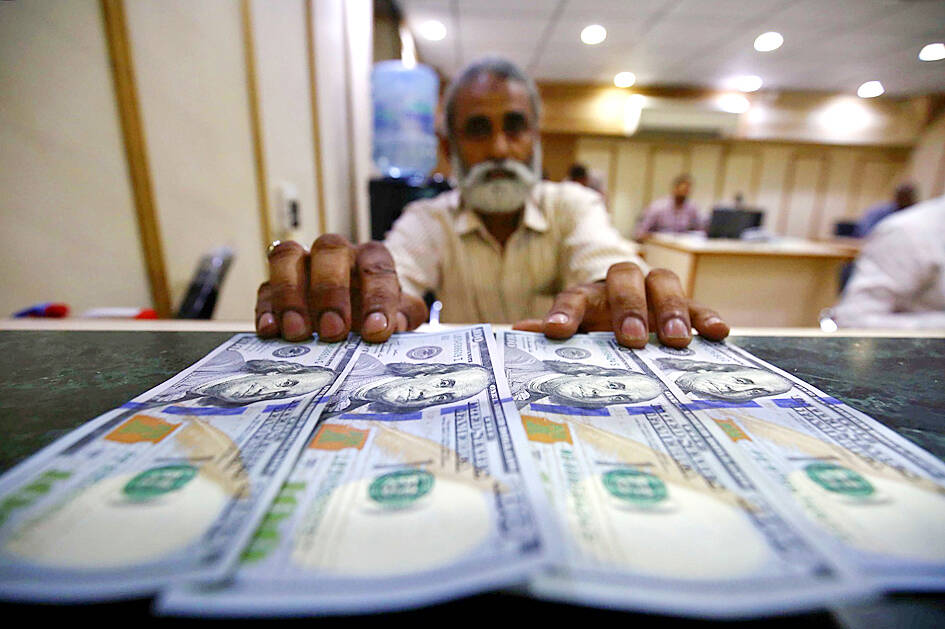The US dollar on Friday rose against the euro and sterling, to reach its biggest weekly gain since February, as investors shifted to safe havens after consumer sentiment data fueled concern about the US debt ceiling and monetary policy.
A University of Michigan survey on Friday showed that May US consumer sentiment slumped to a six-month low on worries that a political dispute over raising the federal government’s borrowing cap could trigger a recession.
Consumers’ long-term inflation expectations rose to their highest since 2011. That could influence the US Federal Reserve, which signaled last week that it could pause its interest-rate hikes.

Photo: EPA-EFE
“Rate differentials are continuing to tilt in the dollar’s favor,” said Karl Schamotta, chief market strategist of Corpay in Toronto. “The surprises in the University of Michigan consumer sentiment survey are painting sort of a stagflationary picture for the US economy, and one that could justify another rate hike at the June Fed meeting, but certainly will diminish odds of rate cuts in the latter half of the year.”
Data also showed US consumer price index inflation cooling to 4.9 percent year-on-year last month. Moreover, weekly jobless claims rose more than expected, but the labor market remains tight, with 1.6 job openings for every unemployed person in March, well above the 1-1.2 range consistent with a market not generating too much inflation.
US Fed Governor Michelle Bowman said that the central bank would probably need to raise rates further if inflation stays high.
The pound fell 0.5 percent to US$1.2448, while the euro weakened 0.59 percent to US$1.0853, a day after falling to a one-month low.
That left the dollar index up 0.63 percent at 102.71, notching a weekly gain of 1.47 percent — its biggest weekly rise since February.
The New Taiwan dollar fell against the US dollar, losing NT$0.020 to close at NT$30.758, down 0.38 percent from NT$30.641 last week.
Joe Manimbo, senior market analyst at Convera, said that elevated US inflation spurred some skepticism about the Fed’s year-end rate cuts, and that the view that other central banks might be closer to pausing rate hikes as well has weighed on European currencies.
“Dollar gains this week have been multidimensional. The buck has served as a safe harbor from worries about a weak Chinese economy and volatility on Wall Street,” Manimbo wrote. “While stronger, it’s too soon to tell whether the dollar’s run of weakness has turned the corner. Markets would need to take rate cuts off the table to lend meaningful upside traction to the greenback.”
Additional reporting by staff writer, with CNA

Semiconductor business between Taiwan and the US is a “win-win” model for both sides given the high level of complementarity, the government said yesterday responding to tariff threats from US President Donald Trump. Home to the world’s largest contract chipmaker, Taiwan Semiconductor Manufacturing Co (TSMC, 台積電), Taiwan is a key link in the global technology supply chain for companies such as Apple Inc and Nvidia Corp. Trump said on Monday he plans to impose tariffs on imported chips, pharmaceuticals and steel in an effort to get the producers to make them in the US. “Taiwan and the US semiconductor and other technology industries

SMALL AND EFFICIENT: The Chinese AI app’s initial success has spurred worries in the US that its tech giants’ massive AI spending needs re-evaluation, a market strategist said Chinese artificial intelligence (AI) start-up DeepSeek’s (深度求索) eponymous AI assistant rocketed to the top of Apple Inc’s iPhone download charts, stirring doubts in Silicon Valley about the strength of the US’ technological dominance. The app’s underlying AI model is widely seen as competitive with OpenAI and Meta Platforms Inc’s latest. Its claim that it cost much less to train and develop triggered share moves across Asia’s supply chain. Chinese tech firms linked to DeepSeek, such as Iflytek Co (科大訊飛), surged yesterday, while chipmaking tool makers like Advantest Corp slumped on the potential threat to demand for Nvidia Corp’s AI accelerators. US stock

The US Federal Reserve is expected to announce a pause in rate cuts on Wednesday, as policymakers look to continue tackling inflation under close and vocal scrutiny from US President Donald Trump. The Fed cut its key lending rate by a full percentage point in the final four months of last year and indicated it would move more cautiously going forward amid an uptick in inflation away from its long-term target of 2 percent. “I think they will do nothing, and I think they should do nothing,” Federal Reserve Bank of St Louis former president Jim Bullard said. “I think the

SUBSIDIES: The nominee for commerce secretary indicated the Trump administration wants to put its stamp on the plan, but not unravel it entirely US President Donald Trump’s pick to lead the agency in charge of a US$52 billion semiconductor subsidy program declined to give it unqualified support, raising questions about the disbursement of funds to companies like Intel Corp and Taiwan Semiconductor Manufacturing Co (台積電). “I can’t say that I can honor something I haven’t read,” Howard Lutnick, Trump’s nominee for commerce secretary, said of the binding CHIPS and Science Act awards in a confirmation hearing on Wednesday. “To the extent monies have been disbursed, I would commit to rigorously enforcing documents that have been signed by those companies to make sure we get